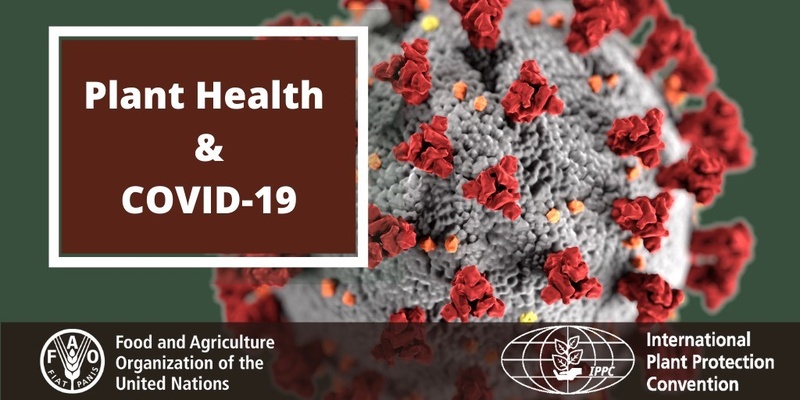Guidance to NPPOs for Mitigating Impacts of COVID-19 Crisis on Plant Health from the CPM Bureau and the IPPC Secretariat
Posted on Tue, 21 Apr 2020, 12:51

In this unprecedented crisis of Covid-19, our first concern is always to ensure that our families, friends and colleagues are protected and safe; this includes looking after ourselves. The Bureau of the Commission on Phytosanitary Measures (CPM), together with the Secretariat to the International Plant Protection Convention (IPPC), are not standing idle but continue to work on our goals of minimizing the introduction and spread of plant pests, and facilitating the safe trade of plant commodities, in particular focused on ensuring that the food supply chain continues to work efficiently. Other components of the IPPC work programme, such as Standard Setting as well as Capacity Development and Implementation Facilitation, are continuing to support the IPPC’s mandate for protecting the world’s plants from pests. Despite all that has transpired since the start of the year, the International Year of Plant Health (IYPH) team continues working to emphasize that we need healthy plants to sustain life on earth. The CPM Bureau, which provides guidance to the IPPC Secretariat and CPM on strategic direction, has been analyzing the evolving situation related to the COVID-19 pandemic and its implications for the work of the CPM and National Plant Protection Organizations (NPPOs). The CPM Bureau is engaged in determining the extent of decision-making possible on behalf of the CPM as this crisis has caused the postponement of the annual CPM meeting planned for April 2020. Based on this assessment, and the importance of making adjustments to ensure the continuity of plant health functions during the COVID-19 pandemic, the following guidance is offered to provide support to NPPOs.
-
Effective operation: NPPOs should recognize the impacts of the COVID-19 pandemic on their capacity to deliver phytosanitary activities and do their best to reduce negative effects.
-
Food movement: NPPOs are encouraged to help ensure the continued supply of food by adhering to and implementing IPPC principles and international standards while also practicing certain flexibility.
-
Use of ePhyto: NPPOs are encouraged to make alternative arrangements for sending and accepting phytosanitary certificates via different mechanisms to facilitate the export and import of plants and plant products, and thus should accelerate their efforts in implementing the IPPC ePhyto Solution as a mechanism to continue to securely exchange phytosanitary certificates (https://www.ephytoexchange.org/).
-
Use of equivalent phytosanitary measures: NPPOs are urged to work together to consider and be prepared to implement effective equivalent phytosanitary measures to verify the export of compliant plants, plant products, and other regulated articles, and also to verify the compliance of consignments upon arrival.
-
Amended phytosanitary requirements: NPPOs should ensure that any changes to their plant health import requirements are technically justified and these, along with any changes to import / export procedures are communicated as quickly and efficiently as possible to relevant stakeholders.
-
Pest free food aid: NPPOs providing or receiving food aid should inspect consignments for pest infection or contamination and treat if necessary to prevent pest introduction and spread.
-
Effects of delay of consignments: NPPOs should ensure that when consignments or the containers holding consignments are delayed, or possibly held in inappropriate surroundings, that they are carefully inspected to ensure pest freedom.
-
Pest surveillance and reporting: NPPOs should increase surveillance for pests around high-risk areas where imported risk goods are stored for a longer period due to prioritization of other essential goods; and they should also develop and maintain adequate information on pest status by reporting this information through the IPPC pest reporting system.
-
Information sharing: NPPOs should share with each other, and through the International Phytosanitary Portal, best practices or other potential interim measures or approaches for inspecting and certifying plant exports that ensure import compliance and safe trade facilitation.
-
Use of social media: NPPOs are encouraged to use social media to communicate information to all stakeholders using the hashtag #IPPC-COVID-19-SafeTrade; and with development of a chart for posting information on IPP; they are also urged to e-mail such types of information to the IPPC Secretariat ([email protected]) with the words "IPPC-NPPO-Flexibility" in the subject line.
-
Collaboration with other agencies: NPPOs should work collaboratively with other border control agencies to the greatest extent possible to facilitate continued smooth trade flows.
-
Coordination with human health authorities: NPPOs, when considering guidance for the health and safety of their plant health inspectors, should coordinate with their respective national human health authorities, guided by the World Health Organization’s COVID-19 advice(https://www.who.int/emergencies/diseases/novel-coronavirus-2019/advice-for-public) to help ensure staff, contractors and any other operators are protected in the best way possible.
We should all keep in mind that implementation of interim measures to alleviate the effects of COVID-19 pandemic will be temporary in nature, and normalised safeguarding activities of NPPOs will resume, in due course once the pandemic is under control.

